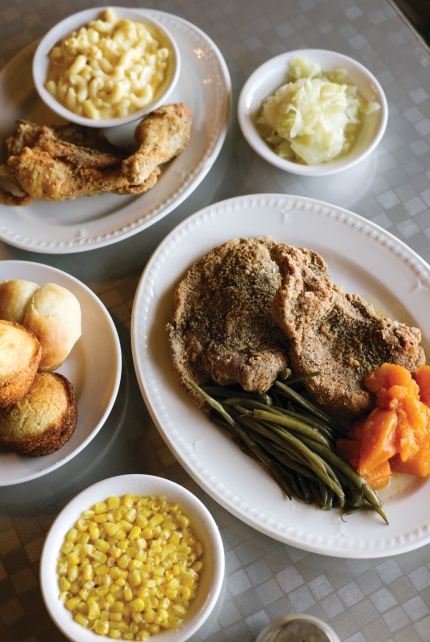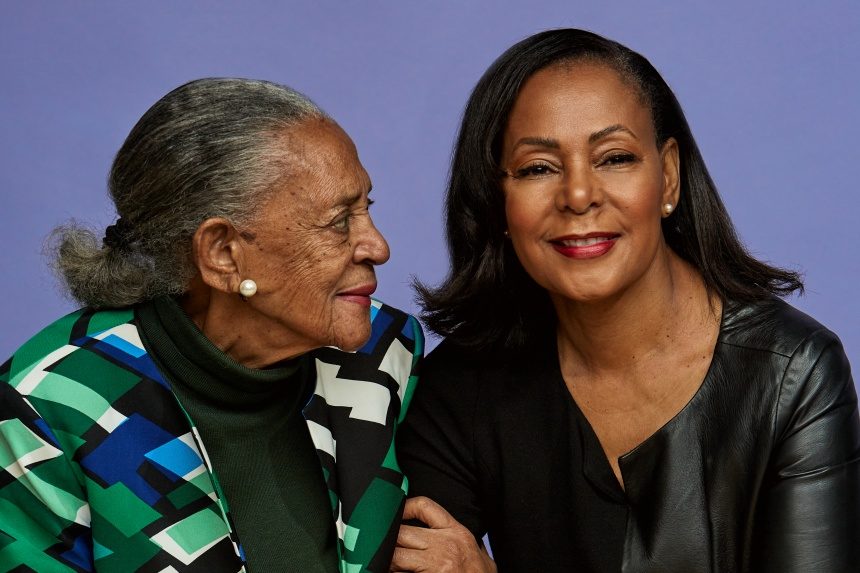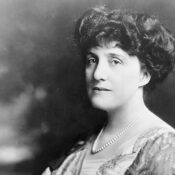Florence Jones Kemp learned she had won a James Beard Award – the Oscars of the American food scene – in February this year when she was in the kitchen at Florence’s Restaurant in northeast Oklahoma City. The 91-year old is in the kitchen every day the restaurant is open, and so when her daughter and director of operations Victoria Kemp got the call, she rushed to the kitchen to tell her. Florence had just placed a plate of her rightly famous yam fried chicken in the expo window when Victoria said, “Mama, you just won a James Beard Award!.”
“Go serve that chicken,” Florence said.
Later, after lunch service, she admitted she had no idea “who James Beard is” and what the award meant. “I never dreamed that a girl from Boley, Oklahoma, would do this,” Florence said, after Victoria explained the significance using Florence’s favorite celebrity food personality, Ree Drummond.
“I came into the living room a couple days after the announcement, and she was watching The Pioneer Woman, like she does every day,” Victoria says. “I told her, ‘Mama, that woman has not won a James Beard Award, and you have.’ That’s when it sunk in.”

After 70 years in business, Florence’s Restaurant is getting the recognition it deserves, and the sharecroppers’ daughter from Boley is too. Located 70 miles due east of Oklahoma City, Boley is one of 13 remaining Black townships in Oklahoma. Black settlers, many of whom were freed slaves, came to the territory ahead of statehood and established more than 50 townships and settlements. Legislation in the early 20th century would disenfranchise them from most of their land, but some of the townships endured.
Jones Kemp’s parents worked sharecropper fields of corn, cotton, peanuts, beans, and sugar cane near Boley, and she, being the next youngest of five, helped around the house, especially cooking and sewing. Her parents separated when she was 11, and she moved to Oklahoma City’s historically Black northeast side to live with a sister.
“My dad brought a girlfriend home, and I wasn’t having it,” Florence says. “I ran away.”
That was the year she turned 12, so she had to enroll in Frederick Douglass High School, a segregated public school not too far from her sister’s house in Oklahoma City. At Douglass, she excelled in and liked Home Economics courses. Her teacher was so impressed that she supplied Florence with fabric to make dresses for her own children, and then spread the word about the young girl’s talents. The money helped to supplement the family’s income, most of which came from her mother’s work at a commercial laundry.
“I didn’t want to do domestic work, though,” Florence says. “So when I graduated in 1950, I left for California with an aunt.”
The plan was to live with a different aunt, but when Florence arrived, she learned that aunt was living in a bordello. So it was back to Oklahoma City, but not before putting in a little work at an uncle’s beer-and-burger joint.
“We served ice cold beer in chilled glasses, and it looked so good,” Florence says. “Once I tried it, I hated it. Too bitter. I haven’t drank since.”
Once she arrived back in Oklahoma City in 1951, she worked briefly as an elevator operator at The Black Hotel, but she didn’t like going up and down all day. When a misunderstanding led to her being laid off, she made the decision to open her own restaurant.
“There was a building available right in front of my house on NE 4th St.,” Florence says. “I’d saved money from my seamstress work, and I’d always picked up shifts in other jobs to make more. I’d always been able to cook. In Boley I’d churned butter, plucked chickens, baked and cooked meals. I knew I could do it; I just didn’t know if anyone would show up.”
The first Florence’s was on NE 4th St., which, prior to one of three Urban Renewal Projects that eviscerated historically Black neighborhoods, was one of OKC’s bustling Black commercial districts. Very few of the businesses from that time remain, so Jones Kemp is notable also for enduring long after many others had failed.
The first menu was dinner only, and it would remain that way for years: fried chicken, short ribs, burgers – soul and southern food of every kind. She was open seven days a week, closing only on Christmas and Thanksgiving. The neighborhood flocked to her restaurant.
“Food was the pathway to community formation for businesses like Florence’s,” says Vanessa Morrison, the CEO of Open Design Collective and a social impact planner. A fourth generation Oklahoman, she grew up with Florence’s cooking. “Black people were bounded on all sides in those days, forced into areas of cities prior to desegregation, and it was often dangerous to leave those areas, so the community met in restaurants, salons, churches, and barbershops where it was safe.”

Morrison talks about Florence as a caretaker, translator, and communicator of Black traditions. “She makes the food our grandmothers and great-grandmothers made,” Morrison says. “The food is in many ways the generational story of Black resilience, strength and excellence. It’s also a geographical guide to our history. Florence has Boley pinto beans on her menu, both as a reminder of those Black townships and a tribute to the ways the Black community has cared for each other.”
In 1969, during the chaos of the Civil Rights Movement and Vietnam War protests, Florence relocated her restaurant to its current location on NE 23rd St., an area of the northeast side that is seeing redevelopment and substantial investment by Black stakeholders and entrepreneurs. She says she didn’t think too much of the social forces moving around her; mainly, she was worried that customers wouldn’t make the mile-and-a-half drive to the new spot.
“Families didn’t always have two cars back then, but they came anyway,” Florence says. “They showed up almost too soon. We didn’t even have all the furniture we needed for the new space, so we made do.”
As an act of futureproofing, she built a barber shop adjacent “in case the restaurant failed.” The barber shop is now the main dining room. The neighborhood restaurant now has the attention of the whole country, and white diners, some of whom started coming in the early 2000s after an article in The Daily Oklahoman, are showing up in larger numbers. James Beard Awards have a magnifying effect on business.
When she got to Chicago in June to receive her award, Florence scanned the room full of chefs, restaurateurs, food writers, and celebrities. In February, when the award’s magnitude had settled in, she asked Victoria, “Do you think they made a mistake?” In Chicago, she just felt gratitude and disbelief.
“I had no idea I’d ever see something like that room full of people, let alone be a featured part of it,” she says.
When asked what’s next for a restaurant that just turned 70 with a 91-year-old owner, she points at Victoria and says, “That’s up to her. It’s her story now.”
Featured image: Florence Jones Kemp and her daughter Victoria Kemp (photo by Charlie Neuenschwander)
Become a Saturday Evening Post member and enjoy unlimited access. Subscribe now



